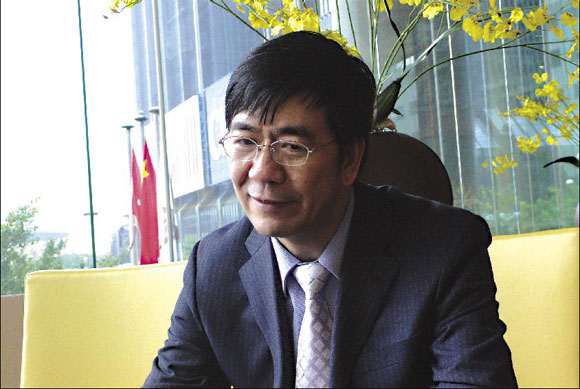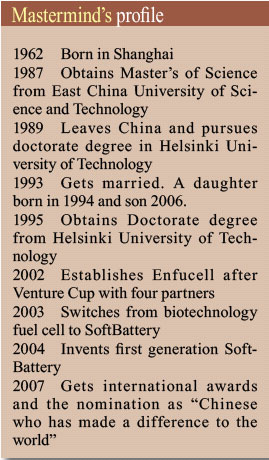Zhang Xiachang is surprisingly humble, given that he has been named "Chinese who has made a difference to the world" along with actress Zhang Ziyi and world champion hurdler Liu Xiang. The Chief Technology Officer of Finnish company Enfucell has won international award for his invention SoftBattery. Yet, he is reluctant to call himself successful.

Zhang Xiachang, the chief technology officer of Finnish company Enfucell
"How do you define success? I'd rather think myself as on the road to success. There's a long way to go, to make SoftBattery a product that would benefit the world," he said.
Paper-thin battery
Zhang Xiachang was born in 1962 in Shanghai to a workers' family. After studying and working in East China University of Science and Technology in Shanghai, he left for Finland in 1989 to study in a postgraduate biotechnology program at the Helsinki University of Technology.
Environmentally-friendly batteries using bio-fuel became Zhang's research interest in 1993. Years of hard work, however, bore fruit in another branch. Realizing that the bio-cells are too expensive to be of commercial value, Zhang shifted his focus in 2003. The first generation of SoftBattery, a kind of 1.5 Volt galvanic cell with the traditional paper printing and lamination technology, was successfully developed a year later.
The world started to take notice in 2007, when the World Economic Forum conferred Enfucell, the company Zhang set up, a Technology Pioneer award - a first time for the Finnish company. Also, American high technology publication, Red Herring, listed Enfucell as one of the top 100 European potential private technology companies.
SoftBattery is used for products that requires small amount of power, which are traditionally supplied with button cells, Zhang said. Bulky for many products, button cells also contain lithium that pollute the environment.
SoftBattery can be disposed with household waste. As thin as 0.5mm and pliable, it can be unobtrusive as bar codes and be easily incorporated into assembly lines.
Enfucell has developed SoftBattery for smart cards, music playing greeting cards, transdermal drug delivery patches and LEDs on paper. It can also be applied in cosmetic products, enhancing the effect of beautifying agents. But Enfucell's greatest potential lies in Radio-Frequency Identification (RFID) technology, Zhang said.
Automatically transmitting and retrieving data stored in transponders, known as RFID tags, through radio wave, RFID technology provides a much more efficient and versatile way to manage objects than barcodes. Hong Kong International Airport, for example, has already adopted RFID technology for luggage tracking.
RFID will make a greater impact on people's lifestyle than the Internet, Zhang said. "If Internet has revolutionized the way people communicate to people, the RFID enables objects to talk to objects."
Imagine a world where products are "intelligent", Zhang said. The refrigerator at your home, for instance, would be able to tell a carton of milk inside has passed the expiry date. Via Internet connection, the refrigerator could send a reminder to your mobile phone. Or better, it can place an order with the convenience store in the neighborhood and can have milk delivered to your door.
"SoftBattery is going to play an essential role in the prevalent adoption of RFID," Zhang said.
There are three kinds of RFID tags: passive, semi-active and active. Passive RFID tags, defined as tags with no internal power source, have many limitations. They can only respond to radio signals within a certain distance. And the signals are weakened if there's water and metal between the tags and the readers.
Tags with on board power supply are much more reliable. If powered with the traditional button batteries, however, RFID tags become too big and too expensive. SoftBattery has uncorked a bottleneck in the adoption of RFID technology, Zhang said.
Sudden fame
Enfucell's breakthrough came when the SoftBattery won international recognition in 2007. People across the world started knocking on its door to explore possible application.
In the same year, Zhang was nominated one of the 11 Chinese who made a difference to the world in 2006 in an award organized by 10 major Chinese media organizations. Interestingly, it's the fervent cheers for Zhang Ziyi at the award ceremony in Peking University that made Zhang Xiachang a celebrity. After BBC mocked the crowd's lack of interest in scientists, the Chinese public started paying attention to Zhang Xiachang and his invention.
Zhang Xiachang has been asked about the incident many times since. "Naturally the public knows more about movie stars than scientists... We impact the world in different ways," he said in an earlier media interview.
How does it feel to be famous?

"It certainly benefits the company," Zhang said. The interest in him increased awareness of the SoftBattery.
"A few days ago, I received a long-distance call from a music instrument producer in China," Zhang said. The producer has been trying to make guitar picks that shine when played, but the power supply remained a problem. After reading about Zhang and his SoftBattery, he couldn't contain the excitement.
The eagerness to access him could be a nuisance, sometimes. "I've received a phone call at 4 am from about some application requirement... He probably didn't realize there is six hours' time difference between Finland and China," Zhang smiled.
Despite fame, his life remains simple as before. On a typical working day, Zhang leaves the office at about five or six in the afternoon, cooks dinner together with his wife and spends the evening with his children.
Being a CFO, he often has to take work home, which he completes before he goes to bed. Even though it's difficult to find time, he makes efforts to stay fit. "I exercise three times a week," he said.
A model of successful foreigners in Finland, Zhang is now a regular speaker at business promotion events organized by the Finnish government. Zhang does have a lot of praise for his second homeland.
"The environment is great. The education system is great. Finns are peaceful and friendly people," he said. "Many have asked me if I felt any pressure because of the recent China-bashing in Western media. I haven't. Most Finns I know believe the Olympic Games should not politicized."
(China Daily HK Edition June 3, 2008)